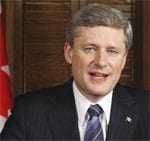Regional report
Calls to renegotiate Nafta are growing louder, and as the three member countries’ economic travails deepen, the arguments for a revision are gaining ground.
 The economic crisis that began in the United States has had a dramatic effect on economies around the world, but none so much as the impact on its two closest trade allies and Nafta partners, Canada and Mexico. The serious consequences of such a close alliance have led some to call for a thorough reexamination of the Nafta agreement.
The economic crisis that began in the United States has had a dramatic effect on economies around the world, but none so much as the impact on its two closest trade allies and Nafta partners, Canada and Mexico. The serious consequences of such a close alliance have led some to call for a thorough reexamination of the Nafta agreement.
However, for those who think it is a good idea to revisit Nafta, the rationales differ. One the one hand, the clear effect of being so closely allied to the United States is that when the US stumbles, its allies stumble, too. From this standpoint, some argue that both Canada and Mexico should build stronger trade relationships with other trade partners outside Nafta.
On the other hand, there are many who argue that a tighter economic partnership among Canada, the United States and Mexico—more along the lines of the European Union model—would be of benefit to all. In particular, for the US a tighter alliance with Mexico—and agreements requiring judicial, labor and environmental reform within Mexico to address corruption and build a stronger Mexican economic base—would not only stem the tide of illegal immigration but also help strengthen US national security.
However, there are plenty of policymakers and economists across the three nations who feel that Nafta is sufficient as it stands and does not need to be revised on any sort of grand scale. Peter Bethlenfalvy, co-president at ratings and analysis firm DBRS, feels that Nafta has had a positive influence as actual volumes of exports and imports have grown significantly for all countries involved. “In the 10 years after Nafta was put in place, total trade among the three Nafta partners expanded from $289 billion to $623 billion,” he points out.
 |
|
Canadian prime minister Stephen Harper: Optimistic about economic fundamentals. |
Tight Bonds, Tough Times
 |
|
Mexico’s president Felipe Calderón: Hoping for closer ties with US. |
Avoiding Past Mistakes
 |
|
Bethlenfalvy: Nafta has clearly boosted intra-regional trade flows. |
Bethlenfalvy says that the result of a protectionist policy, such as the Smoot-Hawley Act, is shrinking global trade. “The Smoot-Hawley Tariff Act saw world trade drop dramatically within two years of its being signed into existence,” he explains. “Virtually every economist would point out that Smoot-Hawley was a bad thing.”
Both the United States and Canada have included what some consider protectionist clauses within their recent stimulus packages—the now-infamous “Buy American” clauses in the US package that have been so hotly debated over the past few weeks, and in Canada the requirement for materials to be sourced locally for certain infrastructure projects related to the stimulus package. However, such policies are contrary to Chapter 11 of the Nafta agreement, which says that each party must treat no less favorably the investments of investors of another party than it accords, in like circumstances, to investments of its own investors.
Although US president Barack Obama during his campaign did discuss revisiting Nafta, many economists believe this was more a political tactic than a likely scenario. Revising Nafta does not necessarily mean demolishing it altogether, though, as Robert Paterson at the University of British Columbia notes. “Nafta has never been significantly amended since its inception despite many threats to do so. It is probably better for our … governments to focus on ways to jointly solve these new problems than obsess about how we did or didn’t solve the problems of the past,” he says.
Carlos Pinéra, a spokesperson at the Nafta Office of Mexico in Canada, notes that the current international scenario differs considerably from the one prevailing in the early 1990s when Nafta was negotiated. “Security, originally not considered in Nafta’s agenda, has modified trade processes and patterns and has become a key issue in the agenda of North America. We need secure borders without involving barriers that raise the costs of our companies,” he explains.
“In that regard,” adds Pinéra, “we believe that it is now time for Mexico, the United States and Canada to conceive a new competitiveness understanding that builds upon Nafta and that aims to extend the trade benefits to get sectors of our societies wider. There are other issues that are important in the agenda of North America, such as the climate change, a concern that the three parties strongly share, and energy, with the idea to secure regional access to sufficient and affordable resources.”
Mexico is against the idea of renegotiating Nafta, according to Pinéra. “Nafta has fulfilled its commitment to create a free trade area,” he says. “Now we must focus our efforts to strengthen Nafta and provide the tools to increase its efficiency. A Nafta upgrade is very different from conducting a renegotiation.”
Concludes Pinéra: “Maintaining open markets and respecting the existing international commitments is the best way to tackle the recession.”
Denise Bedell



